|
|
|
Sort Order |
|
|
|
Items / Page
|
|
|
|
|
|
|
| Srl | Item |
| 1 |
ID:
146435
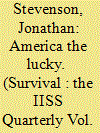

|
|
|
| 2 |
ID:
146427
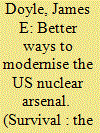

|
|
|
|
|
| Summary/Abstract |
The planned modernisation of the United States’ nuclear forces raises a number of national-security dilemmas that demand the nation’s full attention. Nuclear weapons can deter potential adversaries, but they also create the risk of a nuclear war that would destroy everything the United States seeks to protect. Maintaining too few nuclear weapons could create vulnerabilities, but building too many may lead to war by creating misperceptions of American intentions or consuming defence resources that are needed to address other urgent threats. Effective strategy therefore requires a balance of forces that can survive enemy attack and deliver devastating retaliation while promoting peaceful, stable relationships among states and minimising the chances of nuclear war, nuclear terrorism and further nuclear proliferation.
|
|
|
|
|
|
|
|
|
|
|
|
|
|
|
|
| 3 |
ID:
146430
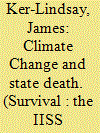

|
|
|
|
|
| Summary/Abstract |
It is now generally understood that climate change poses a grave threat to international security. Rising temperatures will lead to droughts in large parts of Africa, while many low-lying countries in Europe and Asia face the prospect of catastrophic flooding. This is likely to lead to massive population displacement, food shortages, resource competition and an increased risk of conflict. And for one group of countries, the effects of global warming will be nothing short of apocalyptic. The Intergovernmental Panel on Climate Change (IPCC) estimates that oceans will rise between 26 and 82 centimetres by the end of this century. This means that, in the decades to come, there is a real chance that a number of island states in the Pacific and Indian oceans will be completely submerged. At present, the four countries most at risk are Kiribati, Maldives, the Marshall Islands and Tuvalu, with a combined population of around half a million people.
|
|
|
|
|
|
|
|
|
|
|
|
|
|
|
|
| 4 |
ID:
146432
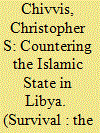

|
|
|
|
|
| Summary/Abstract |
Over the summer of 2014, Libya collapsed into civil war, dashing hopes this former pariah of the West would emulate neighbouring Tunisia in its move towards democracy post-Gadhafi. Since that summer, Libya has been a failed state with duelling governments, beset by conflict and a perilous economic and humanitarian outlook. The United States and its European allies, led by the United Nations, have struggled to form a government of national unity from the country’s feuding factions. As of June 2016, a UN-sponsored Presidential Council was working from makeshift headquarters on a naval base in Tripoli’s harbour, where it coexisted uneasily with a rump parliament backed by hardline Islamists. Meanwhile, a third governing body formerly recognised by the international community as sovereign carried on in the eastern town of Tobruk. The self-appointed leader of the Libyan National Army, General Khalifa Hiftar, was consolidating military power in the east, while the militias aligned with the city of Misrata in the west continued to dominate in Tripoli and other parts of the country.
|
|
|
|
|
|
|
|
|
|
|
|
|
|
|
|
| 5 |
ID:
146429


|
|
|
|
|
| Summary/Abstract |
America’s emergence as a leading producer and prospective major exporter of liquid hydrocarbons – petroleum and liquefied natural gas (LNG) – presents it with historic opportunities: negating OPEC’s ability to control world prices; thwarting Russian manipulation of natural-gas supplies for political ends; reducing global dependence on the volatile Middle East and vulnerable Persian Gulf; and giving US allies in Europe and East Asia an alternative to insecure supplies. A further opportunity looms for the United States to supply energy to China, and in doing so to realise economic gains, help China reduce greenhouse-gas emissions and lend stability to the world’s most critical relationship. China, too, has much to gain.
|
|
|
|
|
|
|
|
|
|
|
|
|
|
|
|
| 6 |
ID:
146433


|
|
|
|
|
| Summary/Abstract |
The emergence of the Islamic State, also known as ISIS or ISIL, in Afghanistan and Pakistan is changing the dynamics of militancy in a region that was already home to a number of local and foreign militant groups. The establishment of ISIS’s Khorasan branch – which uses an ancient name for Afghanistan and the surrounding parts of Pakistan, Iran and Central Asia – in January 2015 marked the first time that ISIS had officially spread outside the Arab world. ISIS was also the first major militant group to directly challenge the Afghan Taliban’s dominance over local insurgency, and to reject the authority and legitimacy of the group’s founding leader, Mullah Mohammad Omar. From its inception, ISIS has tried to differentiate itself from the Taliban, which it has repeatedly attacked on both the military and ideological fronts. In the process, it has managed to gain a foothold in the Afghanistan–Pakistan region, though it has also experienced several ideological and military setbacks. The group’s emergence, and the related intensification of conflict among militant groups in South and Central Asia, has the potential to radically alter the balance of militant forces in the region.
|
|
|
|
|
|
|
|
|
|
|
|
|
|
|
|
| 7 |
ID:
146431


|
|
|
|
|
| Summary/Abstract |
Humanity lives and operates simultaneously in three spaces critical to contemporary life and governance: public, transactional and ecological. Failures in one space can cascade into others. Managing them so as to avoid such failures is an essential function of global governance.
|
|
|
|
|
|
|
|
|
|
|
|
|
|
|
|
| 8 |
ID:
146434


|
|
|
|
|
| Summary/Abstract |
The idea that Africa, a continent shared by more than 50 states with unique histories, cultures and interests, could be more than the sum of its parts dates back at least as far as May 1963, when an emerging sense of a common African destiny led the leaders of free Africa to gather in Addis Ababa, Ethiopia, to create the Organisation of African Unity. Almost 40 years later, a similar feeling of pan-African identity led to the founding of the African Union (AU). A sense of continental solidarity can be seen in cultural products such as the poetry of Léopold Senghor and the songs of Miriam Makeba, and in the behaviour of African states in multilateral forums such as the UN General Assembly and the World Trade Organisation. The tendency for states to adopt and adhere to common African positions (as they did in the negotiations for the Sustainable Development Goals, the Bali round of World Trade Organisation negotiations and the Ezulwini Consensus on UN Security Council reform) reflects an understanding of – and a commitment to – a set of particularly African interests that are best pursued collectively rather than individually. The persistence of nationalistic rivalries among, and the pursuit of divergent policies by, African states is not necessarily evidence that pan-Africanism has no political merit or consequence, any more than differences in policies or the persistence of tensions among European nations represent an indictment of the idea of Europe. Rather, it merely demonstrates the complexity of African states’ foreign policies as they try to advance their interests both unilaterally, on the basis of their own national capabilities, and multilaterally, under the banner of African solidarity.
|
|
|
|
|
|
|
|
|
|
|
|
|
|
|
|
| 9 |
ID:
146426


|
|
|
|
|
| Summary/Abstract |
Although many Western analysts are preoccupied with the likelihood of Russia plotting ‘hybrid warfare’ operations against NATO members, the concept itself is not an explicit part of Russian military doctrine. For Russian analysts, hybrid warfare is a Western construct.1 A reading of Russian military–theoretical debates shows a preoccupation with a broader concept, which can be termed strategic deterrence (strategicheskoe sderzhivanie). This Russian concept is part of official doctrine and strategy, and understanding it is crucial to analysing current and future Russian security and defence policy.
|
|
|
|
|
|
|
|
|
|
|
|
|
|
|
|
| 10 |
ID:
146428
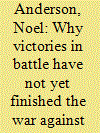

|
|
|
|
|
| Summary/Abstract |
Since 2007, the African Union Mission in Somalia (AMISOM) has been fighting a violent campaign to reclaim territory held by jihadist militants known as al-Shabaab. Military successes, including the liberation of a number of Somali cities from the insurgent group’s control, have generated considerable optimism that al-Shabaab is on the decline.
|
|
|
|
|
|
|
|
|
|
|
|
|
|
|
|
|
|
|
|
|